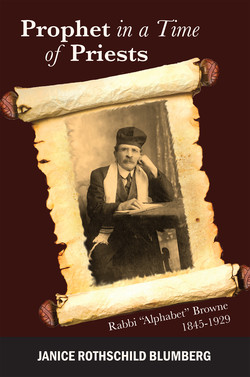Читать книгу Prophet in a Time of Priests - Janice Rothschild Blumberg - Страница 5
На сайте Литреса книга снята с продажи.
ОглавлениеFOREWORD
Since the 1890s numerous rabbis have occupied pulpits in particular congregations for decades. Especially in Reform temples, but also in some Conservative and modern Orthodox synagogues, their responsibilities have included service as ambassadors to the gentiles.” This broad role includes interaction with the general community, ecumenical endeavors, participation in civic and social service projects and organizations, and acting as major spokespeople and faces of the Jewish community. Although conflicts frequently occurred, rabbis have tended to enjoy power and prestige within their congregations and within the broader Jewish and secular societies.
These patterns have not always been the rule. As Janice Rothschild Blumberg makes clear in this path breaking study of Rabbi E.B.M. (“Alphabet”) Browne, virtually all of those who followed Rabbi Abraham Rice, the first ordained rabbi to hold an American pulpit, in 1840, did not do so. During the next decade the vast majority were either fired or resigned under pressure. Laymen (women did not vote, hold office, or even membership in congregations) accustomed to making congregational decisions, refused to relinquish power to rabbis. Rabbis and congregations also came into conflict over reforms—which ones, how many, and how quickly were they to be implemented. From the 1870s into the 1890s rabbis were hired and fired on a regular basis as either the more Reform or traditional faction within their congregation held sway.
The Pittsburgh Platform’s stress on social service over religious observance, the availability of rabbis trained at the Hebrew Union College, the trend toward three separate movements within American Judaism—Reform, Orthodox, and Conservative—and the firm move of congregations into those camps, among other factors intertwined and contributed to the rise of prestige of the rabbinate and the shift of power within congregations toward the rabbis. Consequently, this extended rabbinic tenures.
For the nineteenth and into the early twentieth centuries with few exceptions, the important” rabbis—institution builders and thinkers like Isaac Leeser, Isaac M. Wise, David Einhorn, Kaufmann Kohler, and Emil Hirsch— have drawn the greatest historical attention. Yet itinerant rabbis like Alphabet Browne who struggled from one pulpit to another are perhaps far more representative of the typical rabbinical experience of their era.
As readers of this biography will see, Hungarian-born Browne earned degrees in law and medicine besides rabbinical training and ordination. Well read, fluent in several languages, an international traveler and speaker, Browne was a Renaissance man with an ego to match. I.M. Wise’s protégé and newspaper competitor, he made friends (including President Grant and other public figures) and enemies at every stop.
One of the things that made writing about him so difficult and reading about him so interesting is that he proves impossible to pigeonhole. He is a Reform rabbi with strong tendencies toward Conservative practices and beliefs. Whereas most Reform rabbis rejected political Zionism and remained aloof from the East European Jewish immigrants who flooded into America especially between 1881 and 1924, Browne ardently supported Zionism and became a champion of the poor Jewish immigrant. He ascribed to the authority and prestige of the modern, professional rabbinate but seemingly went out of his way to foment controversy and antagonize powerful opponents. During a period in which rabbis tended to eschew politics, Browne ardently campaigned for candidates, emphasized Jewish bloc voting, and lobbied for patronage positions. A direct descendent, his biographer depicts him in all of his strength as well as his numerous weaknesses.
I first became familiar with Janice Rothschild Blumberg’s work when I began studying southern Jewish history during the late 1970s. She had written a history of Atlanta’s Hebrew Benevolent Congregation (The Temple), which she revised twenty years later. She followed this with two insightful articles on the early history of Atlanta Jewry for the Publications of the American Jewish Historical Society (now American Jewish History). Janice also wrote a memoir treating her first husband, Rabbi Jacob Rothschild, and their experiences with the civil rights movement. We share devotion to the Southern Jewish Historical Society (SJHS), an organization over which she presided, and where we meet regularly at annual conferences.
I have had the pleasure of editing three of Janice’s articles. She provided a fascinating memoir of Rabbi Rothschild and her experiences for an anthology, Quiet Voices: Southern Rabbis and Black Civil Rights, I co-edited with Berkley Kalin. Her preliminary articles on Rabbi Browne’s Atlanta years and on his wife, Sophie Weil Browne, as a rabbi’s wife and clubwoman appeared in the SJHS journal I edit. In all of these works as in her biography of Browne, Janice Rothschild Blumberg melds the literary verve of the journalist with the critical, analytic skills of the historian.
Those who know Janice view her as the model of the southern lady in the highest sense of the concept. Far from being perched on the proverbial pedestal, she is rather a brilliant conversationalist and thinker, who in her eighth decade, has completed a scholarly project that has taken years of research, writing, and repeated revision. In these pages she offers readers great insights into immigration and identity, the roles of rabbis and their wives, interaction between rabbis and between rabbis and congregations, religious ideas and debates, divisions within Judaism, the nature of nineteenth century politics and political figures, regionalism and movement across sections, foreign affairs, and the life and travels of an unusual but also often typical individual of his class, vocation, and age. Enjoy!
Mark K. Bauman
Editor, Southern Jewish History
